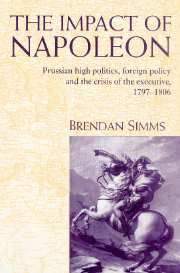 The Impact of Napoleon
The Impact of Napoleon Book contents
- Frontmatter
- Contents
- List of maps
- Acknowledgments
- List of abbreviations
- Map 1 Geography and politics: Prussia and her neighbours in 1792
- Map 2 Geography and politics: Prussia and her neighbours in 1795
- Map 3 Geography and politics: Prussia and her neighbours in 1803
- 1 Introduction
- Part I The structures
- Part II The events
- 5 The failure of neutrality: Prussian policy and politics, October 1804–September 1805
- 6 Delayed decisions: Prussian policy and politics, October 1805–February 1806
- 7 The Hanoverian crisis: Prussian policy and politics, March–June 1806
- Part III The responses
- Bibliography
- Index
6 - Delayed decisions: Prussian policy and politics, October 1805–February 1806
Published online by Cambridge University Press: 27 October 2009
- Frontmatter
- Contents
- List of maps
- Acknowledgments
- List of abbreviations
- Map 1 Geography and politics: Prussia and her neighbours in 1792
- Map 2 Geography and politics: Prussia and her neighbours in 1795
- Map 3 Geography and politics: Prussia and her neighbours in 1803
- 1 Introduction
- Part I The structures
- Part II The events
- 5 The failure of neutrality: Prussian policy and politics, October 1804–September 1805
- 6 Delayed decisions: Prussian policy and politics, October 1805–February 1806
- 7 The Hanoverian crisis: Prussian policy and politics, March–June 1806
- Part III The responses
- Bibliography
- Index
Summary
Ansbach, Potsdam and after: the ascendancy of Hardenberg
The news that French troops under Marshal Bernadotte had flagrantly violated Prussian neutrality by marching through Ansbach and Bayreuth on their way south completely transformed the Central European political scene in early October 1805. Among the allied envoys resident in Berlin the mood was one of jubilation. Metternich reckoned that the affair had ‘thrown the king into the allied camp by hitting him at his most sensitive point’, that is by infringing his neutrality zone. His British colleague, Francis Jackson, believed that the Prussians, those ‘repentant sinners’, were on the verge of joining the allied cause. This did not happen. The tension which had been building up in the shadow of the threatened Russian violation of Prussia's neutrality, did not, as might reasonably have been expected, unload itself over the heads of the offending French. Instead, Prussia only inched very slowly towards accession to the Third Coalition and swung back to the old neutrality stance with alacrity after the disastrous allied defeat at Austerlitz. But the policy of mediation and neutrality resumed was in many ways a mask for Prussia's increasingly client status and had been purchased at the price of an inbuilt conflict with Great Britain which was to erupt with considerable violence in the spring of 1806.
Frederick William reacted to the news of the French action at Ansbach-Bayreuth with uncharacteristic fury and determination. It was, he said, ‘un événement qui peut changer la face des affaires’. Laforest reported that ‘Le Roi s'est laissé allé à un grand excès de colère’, while Duroc found the king so angry that he would not even listen to explanations.
- Type
- Chapter
- Information
- The Impact of NapoleonPrussian High Politics, Foreign Policy and the Crisis of the Executive, 1797–1806, pp. 191 - 229Publisher: Cambridge University PressPrint publication year: 1997


